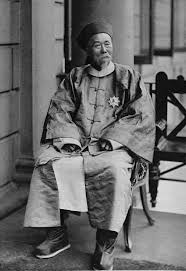
Chinese statesman Li Hongzhang, c. 1890. Despite his notable losses during the Sino-Japanese War, Li Hongzhang nonetheless remains an important general in Chinese military history for his efforts at modernizing the Chinese army. As a viceroy for the imperial court, Li attempted to strengthen China’s standing in the region through diplomatic ties with Western nations, hoping to balance Japan’s rising power to the east.
To “self-strengthen” the Chinese forces fighting against the Taipings, Li arranged for Western advisers to train Chinese soldiers in the use of superior Western weaponry. By 1863, out of a force of forty thousand men, about ten thousand were using rifles, and many had also learned to use cannons. Li’s “modern” forces began winning more battles, and were increasingly relied upon in the fight against the Taipings. Li also took measures to limit the direct help of Westerners, so that they always remained within Chinese control. For example, when he accepted the aid of British and French forces in an 1862 campaign near Shanghai, he insisted that the foreign forces stay within a thirty-mile radius of the Shanghai foreign settlement.
During this period, Li received valuable advice and formed friendships with several notable military leaders from the West. In letters to Li, the British army officer Charles George Gordon (1833–1885) provided valuable insight and suggestions, and the two are said to have chatted for hours on end. Frederick Townsend Ward (1831–1862), an American, was also an acquaintance, and at Li’s suggestion Ward was made commander of the “Ever-Victorious Army,” originally a band of foreign mercenaries hired by Shanghai gentry and merchants. Li was well-known for relying on his mufu relationships rather than official connections for getting things done, a practice that was not considered corrupt in China at the time. Li’s relationship with Ward experienced many ups and downs (especially regarding pay), and impressed on Li the difficulties of working with Westerners.
In 1864, after the Ever-Victorious Army was disbanded, Li hired many of its Western officers to work at the Fenghuangshan military camp, which had been founded for the purpose of training Chinese soldiers in Western military techniques (Chu and Liu 1994, p. 130). In December 1862, Li was named governor of Jiangsu on Zeng’s recommendation. In Shanghai, Li became acquainted with the presence of foreigners and polished his diplomatic skills. He understood that, economically and administratively, Shanghai was in Western hands. He also came to recognize the aggressive expansionist commercial interests of the Western powers and the importance of realizing “economic sovereignty” for China.
Li played a crucial role in the Self-strengthening movement (1860–1895), a wide-ranging effort aimed at preventing foreign encroachments. The quest to acquire Western technology for both military and commercial use was a major aspect of the movement, although few of its proponents ever seriously considered any corresponding political reforms. Li himself emphasized the need to maintain “good governance” within the framework of the traditional structure. In the reform of military, economic, and educational institutions, however, Li always tried to learn from Westerners without giving them too much power. He was fully aware of the West’s expansionist intentions, and did what he could to limit Western involvement.
In 1865 Li founded Jiangnan Arsenal in Shanghai, which incorporated two smaller arsenals that Li had started earlier. In that same year, he also founded the Nanjing Arsenal by relocating equipment from the Suzhou Arsenal. These defense industries were soon followed in 1867 by the Tianjin Arsenal and the Fuzhou Navy Yard, created by Zuo Zongtang and managed by Shen Baozhen. All of these projects were officially approved and received funding from the court. Li was keen to build up China’s military production industries, and, despite personal rivalries, he was generally supportive of those that others had founded because he recognized their importance to China’s self-strengthening. These modern enterprises required sizable funding however, more than the state could provide. Beginning in 1868, after the Nian Uprising had been suppressed, the Qing government turned its attention to the suppression of the Muslim rebels in the northwest and to regaining control of land that the Russians, taking advantage of the chaos in the region, had seized (the Yili region). These expensive military campaigns were a blow to Li’s plans for a substantial development of coastal defenses.